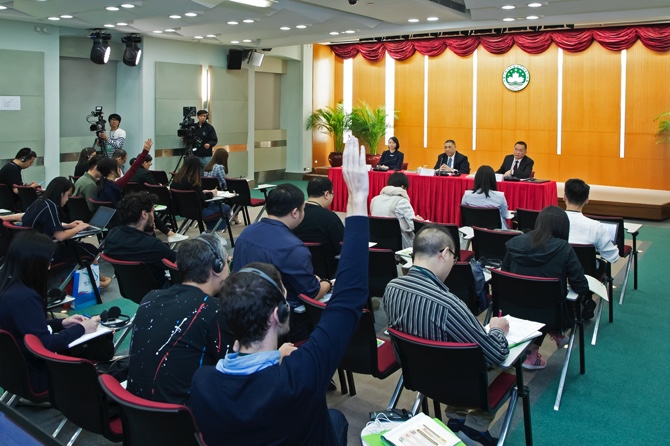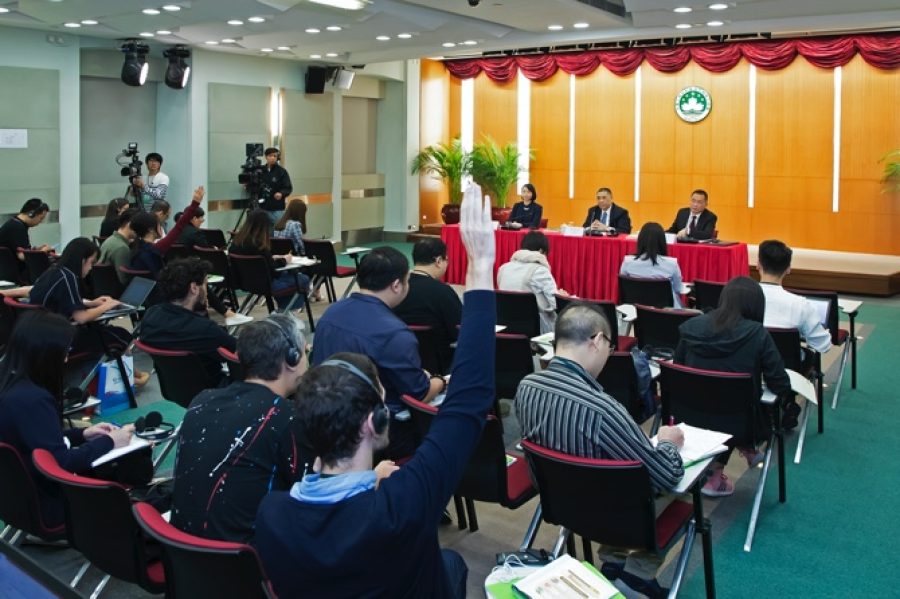Chief Executive Fernando Chui Sai On said on Tuesday he has no regrets that his government withdrew its controversial perks bill and its 60 billion-pataca “sovereign wealth fund” bill during his 10-year term, adding that through experience his government learnt the importance of listening to residents’ opinions before formulating and pushing ahead with its policies.
The chief executive also said that his government decided to withdraw the perks bill – that would have given generous retirement packages to top officials – as it did not want civil society to be become divided over the issue.
Chui made the remarks during a press conference at Government Headquarters summarising his administration over the past decade. The chief executive held the one-hour press conference after presenting the government’s work summary for this year as well as its brief proposal for next year’s budget during a one-hour plenary session of the Legislative Assembly (AL) on Tuesday afternoon. Secretary for Economy and Finance Lionel Leong Vai Tac is slated to present the government’s 2020 budget proposal to the legislature later this year.
Chui answered 20 questions from the media during Tuesday’s press conference.
The outline of the perks bill was passed by lawmakers in December 2013. The final debate and article-by-article vote of the bill was initially slated to be held in a plenary session in late May 2014. Chui announced on May 29, 2014 that the government had decided to withdraw the bill following a street rally and sit-in outside the Legislative Assembly building by thousands, mostly young protesters.
The outline of the government-initiated 60 billion-pataca “sovereign wealth fund” bill was initially slated to be voted on in a plenary session on August 7 this year. However, on that day lawmakers unanimously voted in favour of the government’s request for the legislature to remove the debate of the bill’s outline from the agenda, after Chui had announced on August 5 that the government was requesting the legislature to remove it from the agenda.
The government formally withdrew the 60 billion-pataca fund bill, which proposed the transfer of 60 billion patacas from the government’s financial reserves for the setting-up of the Macau Special Administrative Region (MSAR) Investment and Development Fund, on September 19.
When asked by a reporter whether he regretted that his government had withdrawn the perks bill and the 60 billion-pataca fund bill due to strong opposition to both bills in civil society, Chui said that he had no regrets about the two withdrawals.
Chui, whose second and constitutionally final consecutive five-year term comes to an end at midnight on December 19, said that his government had always been keen to listen to residents’ views throughout the past 10 years. Chui said his government believed at that time that there was a need for the government to propose the perks bill, but it finally decided to withdraw the bill from the legislature following “opinions raised by society”, as the government did not want civil society to become “divided” over the issue.
“I remember that I convened a press conference here [at Government Headquarters] at that time, clearly saying that the government’s bottom line was that we [the government] don’t want society to become divided, therefore we [the government] requested the legislature to withdraw the perks bill at that time,” Chui said, adding that the government believed that then was not a good time to go ahead with the bill.
Chui said that concerning the 60 billion-pataca “sovereign wealth fund” bill, the government believed that – after listening to opinions from civil society – that it would need to carry out two tasks first, namely providing residents with more explanations about the proposed setting-up of the fund and launching a public consultation on the matter, before a debate of the bill in the legislature could take place.
“I don’t think that the two withdrawals are regrettable. Instead, I have learnt from the experience of my 10-year administration that the government always has to listen to residents’ opinions. As a responsible government, if residents do not fully understand [particular measures or policies], it needs to enable residents to understand them,” Chui said.
When asked by a reporter which moments he regarded as unforgettable or particularly difficult during his 10-year term, Chui replied that “the strongest super typhoon over the past few decades” – Hato in 2017 – was an unforgettable and difficult incident to handle. Chui, who did not mention the name of “Hato”, said, “When the natural disaster happened in Macau, I felt it was particularly difficult, as Macau had never faced such a strong super typhoon [in the past few decades],” Chui said.
“I was glad that residents were united [in the aftermath of Hato], while of course the government [always] has to shoulder the important responsibility [for the city’s disaster relief measures],” Chui said, adding that the government has learnt from the experience [of the Hato disaster] and implemented more disaster prevention and mitigation measures following the “unforgettable” catastrophe.
Chui said that civil society has to remember three points about the 2017 disaster, namely 1) the central government’s strong support of Macau, 2) Macau residents’ joint efforts in disaster relief work, 3) the local government’s capability of mobilising personnel to carry out disaster relief work.
A reporter noted that while the government’s proposal for next year’s budget that Chui had just presented to lawmakers mentions various subsidies and allowances for residents, it fails to mention others such as senior citizens’ monthly pension and old-age yearly allowance.
Chui replied that the government’s 2020 budget bill that Leong will present to the legislature contains details of senior citizens’ monthly pension and old-age yearly allowance. Chui said that he “only chose some important points” when he was presenting the proposal for next year’s budget to lawmakers during yesterday’s plenary session.
“[The 2020 budget] has the several items you [the reporter] have mentioned, please be reassured. Maybe my team missed them when drafting [my speech about the budget proposal]. I’m sorry. I should have shown more care concerning senior citizens, Chui, 62, said.
According to the Macau Post Daily, Chui said that concerning his personal plans, he hoped that he “can enjoy a relaxed life,” adding that “what I hope the most is that I can take a rest for a period of time.”






